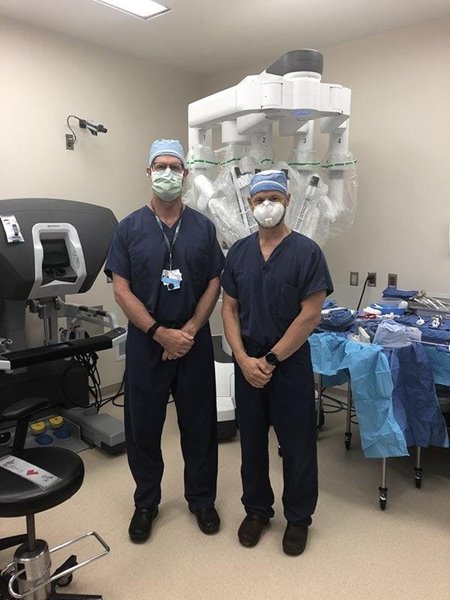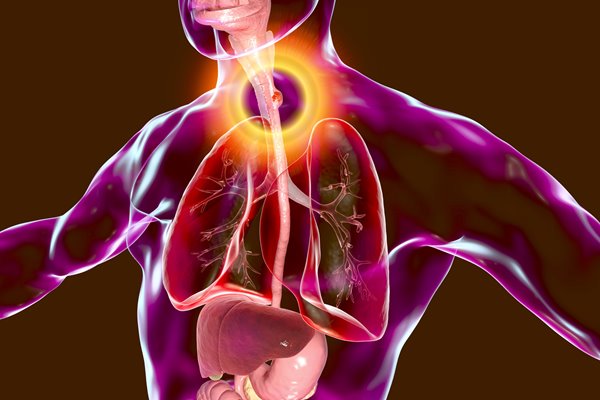Cancer of the esophagus is very aggressive and the surgery to remove it – an esophagectomy – is a highly complex operation. Surgeons remove the esophagus, nearby lymph nodes and a small portion of the stomach. The remaining stomach replaces the removed portion of the esophagectomy. Understandably, this requires extensive training and specialization on the part of the surgeon and care team. For the nearly 20,000 patients diagnosed in the U.S. each year with this disease, esophageal cancer can be devastating.
However, for those with the disease, Carle has some good news.
Carle Cancer Center is leading a new chapter in esophageal cancer treatment in East Central Illinois. With the arrival of Edmund Kassis, MD, thoracic surgical oncologist, Carle now offers robotic surgery, or “minimally invasive esophagectomy,” which doctors may perform in place of an open esophagectomy.
“Patients experience less pain and bleeding, smaller scars and a faster recovery,” Dr. Kassis said. “Because the incisions are smaller than a traditional open surgery, there are numerous benefits.”
Previously, Carle referred esophageal cancer patients to Chicago or St. Louis, meaning patients and their families couldn’t stay close to home to get the care they needed. Now, Carle is one of just a very few hospitals in the Midwest to provide a robotic program for esophageal cancer surgery, making this available to the greater region.
“We’ve got a dynamite team with Dr. Kassis and Dr. (Kevin) Lowe,” Sinisa Stanic, MD, medical director, Cancer Center, said. “Both surgeons will be in the operating room from start to finish, with Dr. Kassis performing the chest portion of the operation and Dr. Lowe the abdominal portion.”
Conducting the operation in this fashion is uncommon, but because the surgery takes place both in the belly and the chest, this approach is beneficial to patients.
“Both of us are trained in cancer surgery. That is very unusual,” Dr. Lowe said. “No matter how many abdominal or chest operations a hospital does, it’s usually a compromise. You tend to have the chest surgeon also doing the abdomen portion or vice versa.”
Here, each physician is operating within his own field of specialization and in concert with the rest of the care team.
 Dr. Kassis and Dr. Lowe are preparing to make history at Carle. They’re meeting patients and discussing the appropriateness for surgery and the unique aspects of that particular patient to tailor the operation accordingly. But not every patient with esophageal cancer will be a candidate for this procedure or type of treatment.
Dr. Kassis and Dr. Lowe are preparing to make history at Carle. They’re meeting patients and discussing the appropriateness for surgery and the unique aspects of that particular patient to tailor the operation accordingly. But not every patient with esophageal cancer will be a candidate for this procedure or type of treatment.
Doctors don’t recommend surgery of any kind if a patient’s cancer spreads beyond the esophagus or if scarring from previous surgery or radiation exist. Because of this, minimally invasive surgery is quickly becoming the preferred surgical option.
“Years back, I was doing this as an open operation and outcomes were good, but my patients had longer term pain and discomfort. I was doing some robot lung cases at the time, and thought it conceivable to do this procedure with the robot,” Dr. Kassis said. “So I started doing cases robotically and noticed patients were getting up and walking sooner, returning to work faster, and they had a lot less pain and discomfort after the operation.”
Categories: Redefining Healthcare
Tags: “coordinated, cancer, care”, Champaign-Urbana, throat
